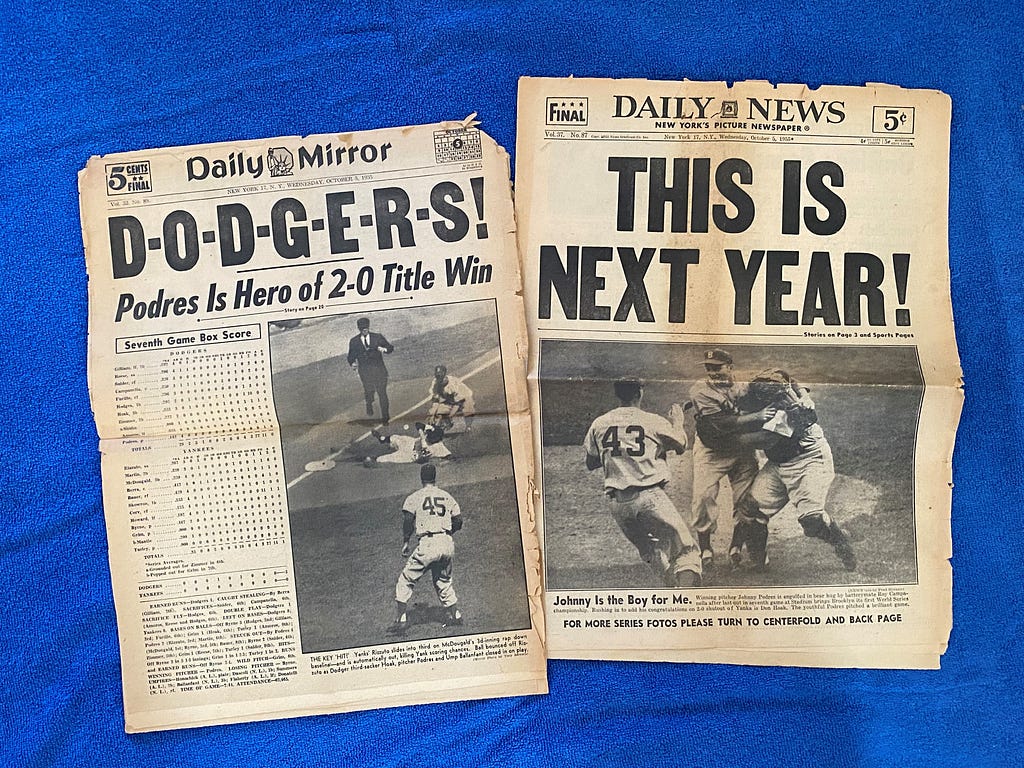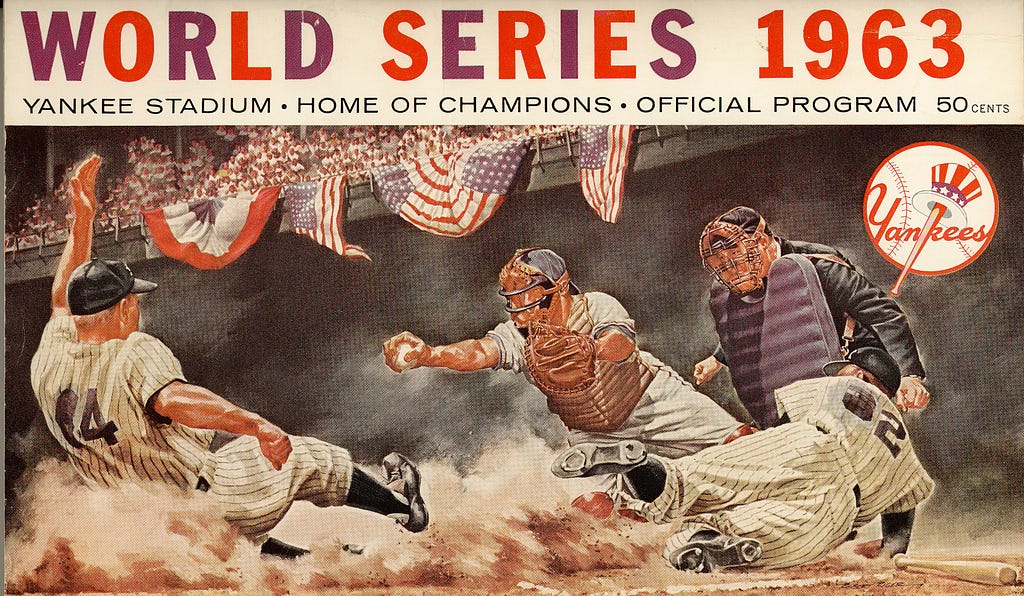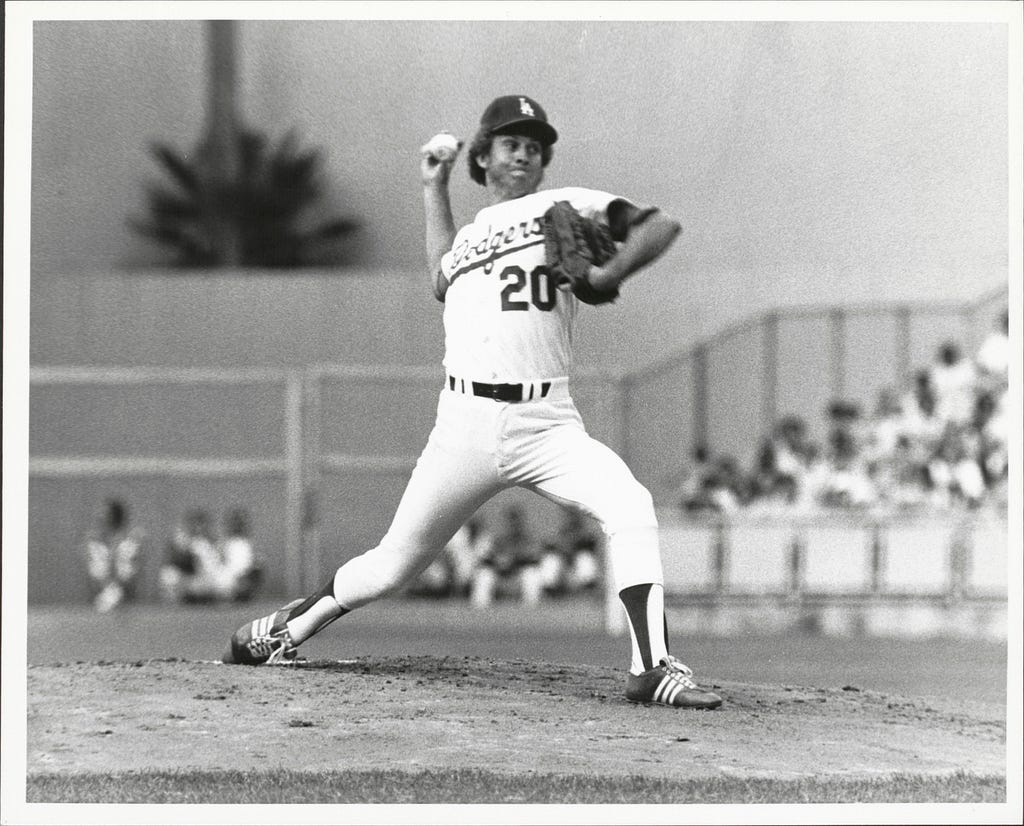World Series: The Dodgers-Yankees historic star gazing

by Mark Langill
The greatest World Series rivalry in history involves 11 meetings between the Brooklyn/Los Angeles Dodgers and New York Yankees between 1941 and 1981. It’s also produced some rare clashes of the megastars and Cooperstown elite.
Of the 12 retired numbers in Dodger history, every player and manager shared a common trait: Each faced the Yankees at least once in a World Series.
Beginning with shortstop Pee Wee Reese (1), who played the first of seven World Series in 1941, and most recently Fernando Valenzuela (34), who pitched a complete game in his only World Series appearance in 1981.
It also meant the Dodgers greats faced their crosstown contemporary: outfielders Duke Snider and Mickey Mantle, pitchers Sandy Koufax and Whitey Ford, shortstops Reese and Phil Rizzuto, catchers Yogi Berra and Roy Campanella.
Just as the 2024 World Series will pit the presumptive league MVPs — Dodgers’ designated hitter Shohei Ohtani and New York outfielder Aaron Judge — previous Fall Classics provided anticipated matchups following the regular season.
Here is a look back at some of the anticipated storylines of past World Series, along with the results.
1941
The first Dodgers-Yankees World Series featured the league MVPs — Brooklyn first baseman Dolph Camilli and the Yankees’ Joe DiMaggio.
Camilli, a first baseman acquired from the Philadelphia Phillies prior to the 1938 season as one of many veterans acquired by team president Larry MacPhail, slashed .285/407/.556/.962 in 149 games with 34 home runs and 120 RBI.
DiMaggio slashed .357/.440/.643/.1.083 in 139 games with 30 home runs and 125 RBI. DiMaggio also compiled a 56-game hitting streak from May 15 to July 16 which captured the nation’s attention and earned MVP honors over Boston’s Ted Williams, who batted .406 with a Major League-leading 37 home runs.
Outcome: The Yankees beat the Dodgers in five games. Camilli batted .167 (3-for-18) with two RBI. DiMaggio hit .263 (5-for-19) with one RBI.
1947
DiMaggio won his third career MVP award, slashing .315/.391/.522/.913 in 141 games with 20 home runs and 97 RBI. The Yankees cruised to the pennant by 12 games over Detroit.
The Dodgers’ Jackie Robinson won MLB’s first Rookie of the Year Award. In addition to making history as the first African American of the 20th century to play in the Major Leagues, Robinson was a catalyst in Brooklyn’s drive for the pennant. The Dodgers eventually won by five games over St. Louis.
Robinson slashed .297/.383/.427/.810 in 151 games with 12 home runs, 48 RBI and a league-leading 29 stolen bases.
Outcome: The Yankees edged the Dodgers in seven games, New York winning the decisive Game 7 at Yankee Stadium 5–2. In his first World Series, Robinson batted .259 (7-for-27) with three RBI. DiMaggio batted .231 (6-for-26) with two home runs and five RBI.
1955
Hall of Fame catchers Yogi Berra and Roy Campanella each won three league MVP awards, but 1955 was the only time their awards coincided with meeting in the World Series.
Campanella in 1955 slashed .318/.396/.583/.978 in 123 games with 32 home runs and 107 RBI as the Dodgers started the season with a 10-game win streak. The Dodgers posted a 22–2 record in their first 24 games. They won the pennant by 13 1/2 games over Milwaukee.
Berra slashed .272/.349/.470/.819 in 147 games as the Yankees (96–58) won the American League by three games over Cleveland.
Outcome: The Dodgers won their only World Series title in Brooklyn history, clinching the championship with a 2–0 victory in Game 7 at Yankee Stadium. Campanella batted .259 (7-for-27) with two home runs and four RBI. Berra batted .417 (10-for-24) with one home run and two RBI.
Berra almost spoiled Brooklyn’s party in the sixth inning. The Yankees had runners on first and second with no outs when Berra sliced a line drive toward the left field pole. Reserve outfielder Sandy Amoros, who had just been inserted into the game for his defense, made a lunging catch and started a 7–6–3 double play.
1956
Another battle of MVPs featured Yankees’ slugger Mickey Mantle and Brooklyn’s Don Newcombe, who also won MLB’s first Cy Young Award.
During the regular season, Newcombe went 18–2 over the final three months of the season as the Dodgers repeated as NL champions by just one game over Milwaukee. In 38 games (36 starts), Newcombe went 27–7 with a 3.06 ERA, five shutouts and 18 complete games. He led the NL with a 0.989 WHIP.
Mantle won the American League triple crown. He slashed .353/.464/.705/1.169 with 52 home runs and 130 RBI as the Yankees won the pennant by nine games over Cleveland.
Outcome: After carrying the Dodgers to the World Series, Newcombe lost the final postseason game in Brooklyn history, 9–0, in Game 7 at Ebbets Field. In two starts, Newcombe went 0–1, allowing 11 earned runs in 4 2/3 innings.
Mantle batted .250 (6-for-24) with three home runs and four RBI.
1963
Koufax won league MVP honors during the regular season with a 25–5 record and 1.88 ERA in 40 starts. It was the first of three Cy Young Awards during an era in which there was only one trophy given between the two leagues.
By 1963, Koufax was in the prime of his Hall of Fame career. He pitched the second of four career no-hitters against the Giants at Dodger Stadium on May 11. The Dodgers won the pennant by six games over the St. Louis.
The Yankees (104–57) cruised to a fourth consecutive pennant in 1963, finishing 10 1/2 games ahead of Chicago. Although sluggers Mantle and Roger Maris — who combined for 115 home runs during their “M&M Boys” power show in 1961 — received the most attention, New York catcher Elston Howard won league MVP honors in 1963. Howard slashed .287/.342/.528/.869 in 135 games with 28 home runs and 85 RBI.

Outcome: The Dodgers became the first team to sweep the Yankees in a Fall Classic. Series MVP Koufax went 2–0, allowing three earned runs in 18 innings, including a then-record 15 strikeouts during a 5–2 victory in Game 1 at Yankee Stadium.
Koufax’s 2–1 victory in Game 4 in Los Angeles remains the only Dodger championship clinched on their home field.
In four games, Howard batted .333 (5-for-15) with an RBI.
1977
Right-hander Don Sutton missed the 1966 World Series as a rookie because of a strained forearm muscle late in the season. Manager Walter Alston didn’t want to risk Sutton’s future.
A decade later, Sutton was a cornerstone to the Dodger pitching staff. He surpassed 20 wins for the first time in 1976, and in 1977 posted a 14–8 record and 3.18 ERA in 33 starts. He was the winning pitcher for the National League in the 1977 All-Star Game at Yankee Stadium.

First-year manager Tommy Lasorda chose Sutton as his Game 1 pitcher in the Bronx.
For New York, first-year outfielder Reggie Jackson slashed .286/.375/.550/.925 with 32 home runs and 110 RBI. Jackson finished eighth in the MVP voting behind three teammates: third baseman Graig Nettles (fifth), reliever Sparky Lyle (sixth) and catcher Thurman Munson (seventh).
Outcome: The Yankees won the series in six games as “Mr. October” was born. Jackson hit three home runs on consecutive pitches in the Game 6 clincher at Yankee Stadium. Overall, Jackson batted .450 (9-for-20) with five home runs and eight RBI.
In two starts, Sutton went 1–0 and allowed seven earned runs in 16 innings.
1981
Outfielder Dave Winfield left San Diego in the offseason and signed a record 10-year contract with the Yankees in the offseason. He was an All-Star and Silver Slugger and would end up finishing seventh in the AL MVP voting.
But the Yankees also had a special rookie on the mound in Dave Righetti, who had a 2.05 ERA over 15 starts. He wound up winning the AL Rookie of the Year.
The Dodgers had their own rookie sensation — Valenzuela, whose incredible 0.50 ERA and eighth straight complete games to begin the season launched “Fernandomania.” Valenzuela ended up becoming the only Major Leaguer to win Rookie of the Year and the Cy Young Award in the same season.
The Dodgers also had — for the final time in a season — their legendary infield of Steve Garvey, Davey Lopes, Bill Russell and Ron Cey.
Outcome: The Dodgers won the series in six games. Valenzuela’s Game 3 effort — a 147-pitch complete game — stands as one of the legendary starts in Dodger post season lore. After allowing four runs through three innings, he shut the Yankees out for the final six.
Righetti started that same game and was out after two innings, having allowed three runs.
Winfield went 1-for-22 in the series, while Cey was one of the tri-MVPs for the Dodgers in the series.
Dodgers-Yanks historic star gazing was originally published in Dodger Insider on Medium, where people are continuing the conversation by highlighting and responding to this story.